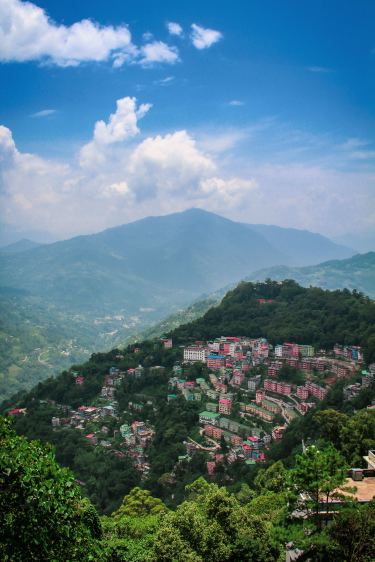
A planned rally advocating for the protection of cows and a nationwide ban on cow slaughter is stirring up unrest in several northeastern Indian states. The Gau Dhwaj Sthapana Bharat Yatra, which has the endorsement of the Hindu monk Swami Avimukteshwaranand Saraswati, is the leading force in this campaign which demands the cow be declared “Rashtra Mata” (Mother of the Nation). However, this movement has met fierce resistance in states like Meghalaya, Nagaland, and Arunachal Pradesh, where beef consumption is an integral part of the local diet and culture.
In Meghalaya, the Khasi Jaintia Christian Leaders Forum (KJCLF) issued a statement urging the state government to prevent the rally, which is scheduled for October 2. Rev. Dr. E.H. Kharkongor, secretary of the KJCLF, said that the proposed yatra goes against the “diverse and fraternal ethos” of Meghalaya. “It has always been the case that events like these promote sectarianism, mistrust, and misunderstanding with the potential to trigger law and order issues,” Rev. Kharkongor said, stressing that the yatra is being led by groups from outside the state.
Local Groups and Politicians Speak Out
The opposition to the rally has come not just from religious leaders but also from local political and social groups. The Khasi Students Union (KSU), a powerful voice in the state of Meghalaya, declared that it would not allow the rally to take place. The KSU and other groups argue that the movement poses a direct challenge to the region’s customs, where beef is a dietary staple. “The consumption of beef is common among the communities in Meghalaya,” said Angela Rangad from the activist group Thma U Rangli Juki. Rangad criticised the rally as a “Hindu majoritarian communal attack” on the secular culture of the state.
Meghalaya’s Education Minister Rakkam A. Sangma also voiced his opposition, saying that those advocating for a beef ban are “extremists” who should not dictate what people should or should not eat. “Nobody on earth can force me to stop eating a food I like, and beef is my favourite food,” Sangma stated, adding that linking beef to religion is unnecessary.
Nagaland and Arunachal Pradesh Deny Entry
In Nagaland, where the BJP is part of the ruling coalition, the state government took a clear stand against the rally, denying entry to Swami Avimukteshwaranand and his team. The government cited the sentiments of the local population, with Nagaland’s Naga Students’ Federation opposing the event, saying it would “not allow Nagaland to be used as a platform for divisive activities.” Beef is widely consumed in Nagaland, and local customs hold that any restrictions on diet would infringe on cultural rights.
Similarly, in Arunachal Pradesh, the All Arunachal Pradesh Students' Union (AAPSU) blocked Swami Avimukteshwaranand’s team at the airport, preventing them from entering the state. AAPSU general secretary Ritum Tali stated that while they respect the Swami's beliefs, the campaign against cow slaughter interferes with their constitutional rights. “Whatever we want to eat is our constitutional right. We sacrifice a cow as part of our traditional customs,” Tali said.
Despite the BJP’s presence in both Nagaland and Arunachal Pradesh, local authorities aligned with public sentiment to block the rally. Both states cited concerns over maintaining communal harmony and respecting local traditions.
Tripura Allows the Rally Amid Tensions
Tripura, another northeastern state, took a different approach, allowing Swami Avimukteshwaranand to continue his campaign. In Agartala, the Swami reiterated his call for the cow to be declared “Rashtra Mata” and pushed for stricter penalties for cow slaughter across India. Swami Avimukteshwaranand installed a ‘cow flag’ at Talakona in West Tripura district, symbolising the movement's goals.
Despite the protests and bans in neighbouring states, the Swami criticised the lack of action from the central government. “Even after 78 years of independence, different governments have come to power, yet business is still being done with cow meat,” he remarked, lamenting that no national law to protect cows has been enacted despite widespread Hindu support.
Cultural Autonomy Versus National Movements
The resistance to the Gau Dhwaj Sthapana Bharat Yatra highlights the cultural and religious divide between India’s northeastern states and the cow protection / vigilantism movement which has been made into a national issue by right-wing Hindu nationalists. Articles 371(A) and 371(G) of the Indian Constitution grant the northeastern states special protections to preserve their cultural practices, including dietary customs. For many in the region, movements like the yatra are seen as attempts to impose external values on a population with distinct traditions.
As the yatra continues, it remains clear that the debate over cow protection laws will persist, particularly in regions where the practice of beef consumption is deeply ingrained in both culture and religion. For now, the northeast remains a critical arena for this ongoing conflict between religious beliefs and cultural autonomy.




